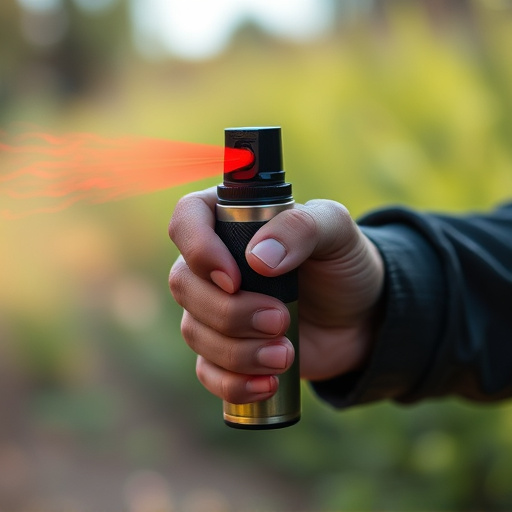TL;DR:
After pepper spray exposure, immediately:
1. Move to fresh air.
2. Rinse face and eyes with clean water for at least 15 minutes.
3. Avoid rubbing eyes and use a clean cloth or eye wash solution to cleanse.
4. Apply cold compresses for swelling.
5. Take slow breaths, stay hydrated, and consider over-the-counter meds for respiratory distress.
For severe symptoms or persistent issues:
– Consult a healthcare professional.
– Use hydrocortisone cream or calamine lotion (for itching).
– Wash affected areas with warm water and mild soap.
– Regularly wash hands for 20 seconds to prevent spreading irritant.
“Discover the power of civilian-grade pepper defense spray and learn how to effectively navigate its potent effects. This comprehensive guide delves into the science behind these self-defense tools, offering practical strategies for immediate and long-term care after exposure. From understanding the composition and impacts to treating skin irritation and managing respiratory distress, we provide essential insights on how to mitigate pepper spray exposure. Master the art of prevention and gain control with our expert advice on staying safe.”
- Understanding Pepper Spray: Composition and Effects
- Immediate Steps After Exposure: Rinsing and Protecting Your Eyes
- Treating Skin Irritation and Burn-Like Symptoms
- Managing Respiratory Distress and Coughing Fit
- Long-term Care and Preventive Measures for Future Exposure
Understanding Pepper Spray: Composition and Effects
Pepper spray, a popular self-defense tool, is a chemical compound designed to disrupt an attacker’s vision and breathing temporarily. Its composition typically includes capsaicin, the active ingredient found in chili peppers, mixed with various other chemicals to enhance its effectiveness and duration. When deployed, pepper spray causes a burning sensation in the eyes, nose, and throat, leading to temporary blindness and difficulty breathing. Understanding these effects is crucial for knowing how to treat pepper spray exposure.
Knowing how to mitigate the impact of pepper spray exposure is essential. Immediately after coming into contact with pepper spray, one should move to an area with fresh air. Removing contaminated clothing and washing the affected areas with water can help dilute the chemical. For eye exposure, flushing with water for at least 15 minutes is recommended. Inhaling through a damp cloth or seeking medical attention if difficulty breathing persists are also vital steps in treating pepper spray exposure.
Immediate Steps After Exposure: Rinsing and Protecting Your Eyes
After being exposed to pepper spray, it’s crucial to take immediate steps to mitigate the effects and begin the healing process. The first action should be to rinse your face thoroughly with clean water for at least 15 minutes. This helps to flush away as much of the irritant as possible. Hold your eyes open and gently splash water over them, making sure to keep them well-irrigated.
Protecting your eyes is paramount. If available, use a clean cloth or eye wash solution to further cleanse and soothe the affected area. Avoid rubbing your eyes, as this can exacerbate irritation. Instead, focus on gentle cleaning and keeping them closed to minimize contact with any residual spray. Seek medical attention if symptoms persist or worsen, ensuring you have a clear understanding of how to treat pepper spray exposure effectively.
Treating Skin Irritation and Burn-Like Symptoms
Pepper spray, while effective for personal defense, can cause skin irritation and burn-like symptoms. If exposed, it’s crucial to act quickly. The first step is to rinse the affected area with plenty of clean water for at least 15 minutes. This helps to dilute and wash away the pepper spray particles. After rinsing, apply a cold compress or ice pack wrapped in a towel to help soothe and reduce swelling.
For severe cases or if irritation persists, consider using over-the-counter hydrocortisone cream or calamine lotion. These products can help alleviate itching and inflammation. Avoid scratching the affected area as it may worsen the skin damage. If symptoms remain persistent or severe, consult a healthcare professional for further guidance and treatment options.
Managing Respiratory Distress and Coughing Fit
Pepper spray exposure can lead to respiratory distress and coughing fits, especially in individuals with pre-existing respiratory conditions or asthma. If you experience these symptoms after coming into contact with civilian-grade pepper defense spray, it’s crucial to take immediate action. First, move to an area with fresh air, as the primary goal is to reduce your exposure to the irritants.
To manage coughing and breathing difficulties, try taking slow, controlled breaths. This can help calm your respiratory system. Over-the-counter medications like decongestants or antihistamines might provide some relief, but always consult a medical professional for personalized advice. Staying hydrated is also essential; drinking water can help thin out any remaining spray residue in your airways.
Long-term Care and Preventive Measures for Future Exposure
After experiencing pepper spray exposure, it’s crucial to understand long-term care and preventive measures to ensure future safety. The first step in how to treat pepper spray exposure is to immediately seek fresh air. Remove any contaminated clothing and wash the affected areas with warm water and mild soap. This process helps dilute the pepper spray residue, alleviating irritation and discomfort.
Additionally, keep eyes closed and avoid rubbing them to prevent further agitation. If breathing becomes challenging due to residual fumes, move to an area with clean air. Over-the-counter antihistamines and eye washes can provide some relief from symptoms like stinging, redness, and coughing. Regular handwashing for at least 20 seconds with soap and water is essential to avoid transferring the irritant to others or spreading it further on your body.
Knowing how to treat pepper spray exposure is crucial for anyone who may encounter this powerful irritant. By understanding the composition and effects of civilian-grade pepper spray, and following immediate steps like thorough rinsing and protecting the eyes, you can mitigate symptoms. Additionally, treating skin irritation, managing respiratory distress, and taking long-term care measures will ensure complete recovery. Following these simple yet effective tips on How to Treat Pepper Spray Exposure can help prevent lasting damage and provide peace of mind in potentially dangerous situations.
